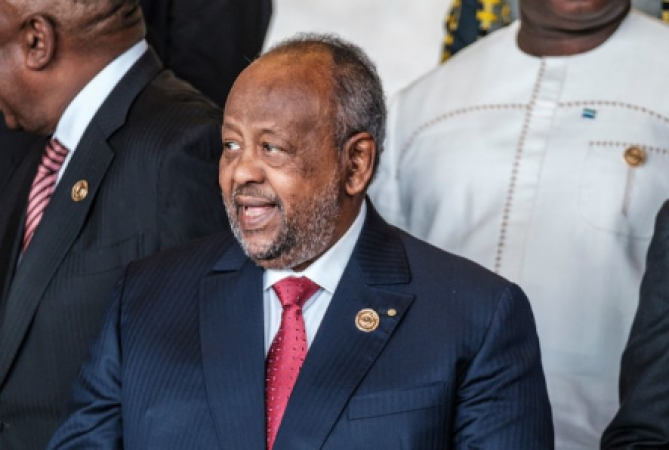
Riyadh: Prior to Friday's historic Arab League summit, the president of Djibouti praised Saudi Arabia for its support of his nation and called for regional cooperation in the face of mounting difficulties.
President Ismail Omar Guelleh issued a warning in an interview with the newspaper Asharq Al-Awsat, citing the fighting in Syria, Libya, and Somalia as some of the major challenges facing the Arab world, in addition to recent Israeli attacks against Islam and Christianity in Jerusalem.
"We hope that the Arab summit hosted by Saudi Arabia will result in recommendations and decisions that help to resolve critical issues and challenging circumstances faced by the Arab world, while maintaining unity and solidarity among Arab brothers," Guelleh said.
Also Read: Indonesia increases trade with Egypt to gain access to a larger African market
Unquestionably regrettable, he added, is the lack of an Arab state and its distance from Arab consensus and decisions. Since the start of the crisis, the Syrian file has been the focus of numerous negotiations on an international and regional level.
In accordance with the aspirations of the Syrian people and in support of efforts to reach a political settlement that puts an end to the suffering of our Syrian brothers and sisters, we are convinced that a political solution is the only way to resolve the Syrian crisis.
We applaud these initiatives and the strides made towards ending Syria's political isolation, which will lessen suffering and fulfil the aspirations of the Syrian people for security and stability.
According to Guelleh, the inclusion of Syrian President Bashar Assad at the Jeddah summit on Friday represents a natural reintegration. He continued, "The Arab world is not isolated from geopolitical changes, and it is natural for any Arab country to cooperate with any bloc, whether economic or military, if it sees its interest in it, provided it does not contradict common Arab action and the principles of the international community."
Also Read: Philippines supports safeguards for Kuwaiti workers
The president praised Saudi efforts in the field and mentioned the Red Sea as another area of concern for maritime security.
In 1956, Saudi Arabia was one of the first nations to establish the Jeddah Charter, a common security regime for the Red Sea. Djibouti plays a crucial role in efforts to maintain security, stability, protect maritime navigation, and fight terrorism because of its location at the Bab Al-Mandab Strait's entrance.
One of the first nations to ratify the Charter of the Council of Arab and African States bordering the Red Sea was Djibouti in January 2020.
However, Guelleh claimed that the situation in Sudan, where more than 800 people have died as a result of violence since April 15, is the most urgent one.
"We closely monitor the developments and events affecting Sudan with great concern, and we express our full readiness through our membership in numerous continental and regional organisations to do everything within our power to preserve the stability and unity of dear Sudan and to further the interests of its kin-loving people," he said. We are prepared to begin active mediation within the Intergovernmental Authority on Development.
In fact, the presidents of Kenya, South Sudan, and the Republic of Djibouti have been asked to visit Sudan, and negotiations to start mediating are still ongoing.
"However, the three presidents' trip to Khartoum is contingent upon the end of hostilities and the upkeep of the ceasefire. We anticipate that the group's initiative will help in the search for a quick fix to the crisis, which has been getting worse since mid-April. We also applaud Saudi Arabia and the US for mediating to bring about the Jeddah Agreement to safeguard civilians.
The president of Djibouti commented on the tensions surrounding the Grand Ethiopian Renaissance Dam by saying, "Our vision regarding the Renaissance Dam issue is clear and unwavering, and it strives to reach an agreement that results in a satisfactory resolution for all parties concerned.
"We are hopeful that this crisis will be resolved, and we think it won't have any bearing on relations between Arab and African nations. Therefore, the concerned nations must come to an agreement on an equitable distribution of the Nile's waters so that everyone can profit from it. All nations ought to be united by the Nile rather than divided by it.
Guelleh praised the "deeply rooted relations" between Djibouti and Saudi Arabia and thanked the Kingdom for its assistance to his nation.
He continued, pointing out the Djibouti-Saudi Commission's function as a general framework for bilateral cooperation and as a businessmen's advisory council between the two nations. Saudi support has continued in political, economic, educational, and other fields.
Guelleh claimed that Saudi assistance also includes humanitarian work in Djibouti, where Saudi infrastructure is being built in the port city of Obock in the country's north through KSrelief to house a sizable number of Yemeni refugees.
The King of Saudi Arabia and Crown Prince Mohammed bin Salman were thanked by the president of Djibouti for their contributions to a number of international and regional arenas.